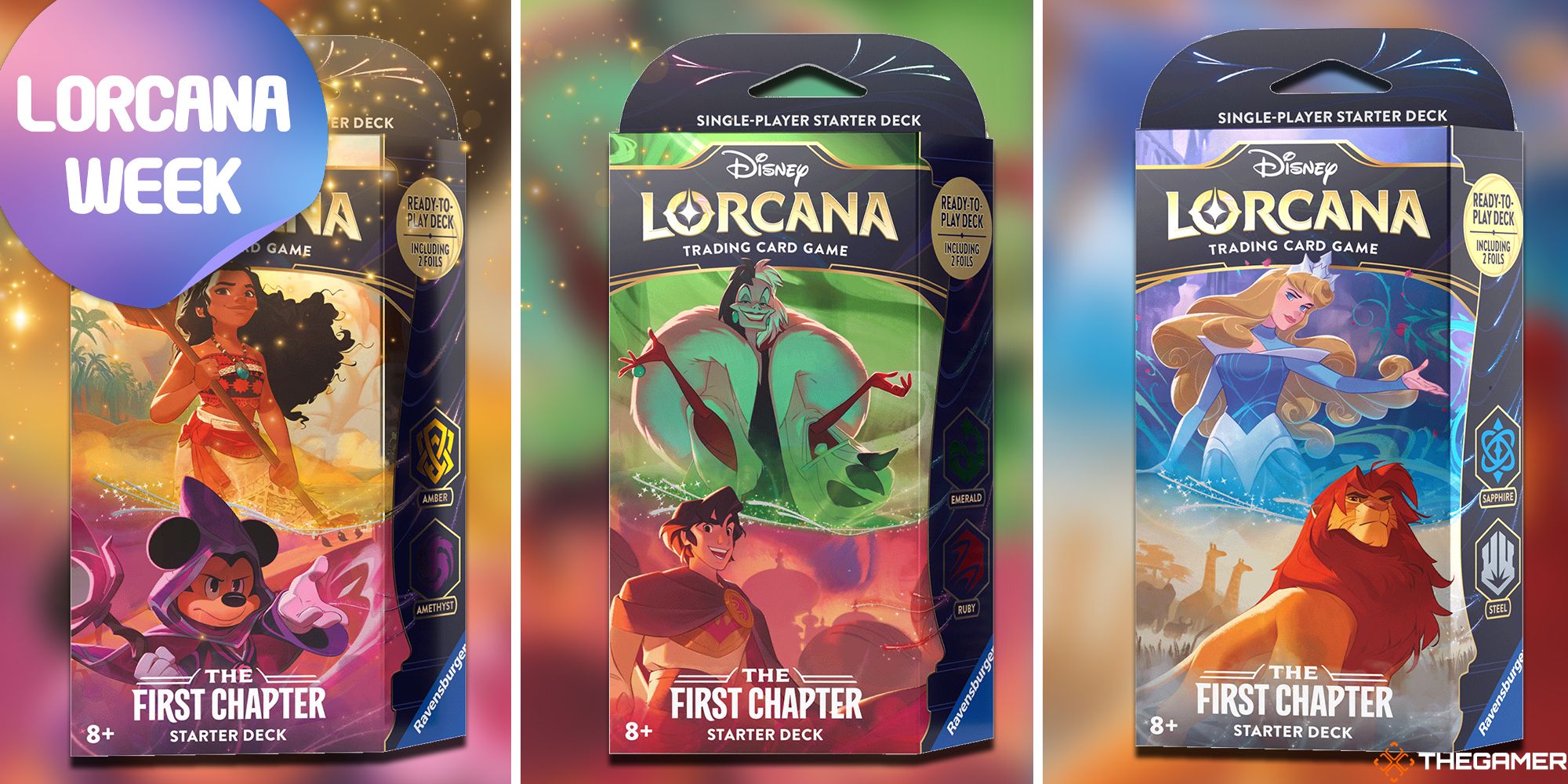With the launch of Disney Lorcana's The First Chapter, Ravensburger is releasing three starter decks: a Mickey and Moana deck (Amber/Amethyst), a Cruella and Aladdin deck (Emerald/Ruby), and an Aurora and Simba deck (Steel/Sapphire). These decks will help ease you into the game by showing off a variety of mechanics and teaching many basic, and even some advanced, strategies.
Each of the decks has its own strengths and weaknesses, and, when paired together you'll find that they have a rock-paper-scissors quality; each can wreck, and be wrecked by, one of the other three. All three are a lot of fun to play, though, and you can't go wrong choosing any of them.
3 Aurora And Simba - Steel/Sapphire
The objective worst of the three starter decks is an incredibly fun one to play. The Steel/Sapphire deck is all about filling up your inkwell quickly and playing big cards fast.
If you can get your heavy-hitters like Mufasa, King of the Pride Lands and Simba, Returned King out fast enough, you can overwhelm your opponent with sheer size and win the game before they even have enough ink in their own well to deal with you. It's a fun deck if you like to win games quickly and slam down big cards to intimidate your opponents.
The problem with this deck is that it relies heavily on specific cards in order to be successful. You need to spend your first few turns playing cards like Mickey Mouse, Detective, Gramma Tala, Storyteller, and the song One Jump Ahead in order to ramp up your inkwell faster than your opponent.
Then, you need to get your high-cost cards like Maui, Demigod, and Simba, Rightful Heir on the board right away, before your opponent has enough ink to answer them. When it works, you can run wild and leave your opponents without any recourse. When it doesn't work, i.e. when you fail to ramp your Inkwell and play high-cost cards early, this deck completely loses its big advantage.
There are only seven ramp cards total (two One Jump Ahead, two Gramma Tala, and three Mickey Mouse, Detective) which can make it difficult to ensure you get them in your opening hand. If you draw them later in the game, they're essentially dead cards that won't provide any value to you or power to your board.
For this reason, Steel/Sapphire is the most inconsistent of the three. With this deck, you either win quickly, or lose slowly. More often than not, it struggles to keep up.
2 Aladdin And Cruella - Emerald/Ruby
Of the three base set starter decks, Emerald/Ruby is the most challenging (and rewarding) to pilot. It utilizes sneaky tactics to surprise and confuse your opponents. Many of its cards allow you to buff your characters, so they can "swing up" and make favorable trades with your opponent's more expensive cards. You'll also be playing many cards that drain lore from your opponent's point total. Emerald/Ruby is a control-style deck that has some strong advantages in multiplayer and does a great job stalling the Steel/Sapphire starter deck in particular.
One of this deck's greatest strengths is its Evasive options. With Pongo, 'Old Rascal and Peter Pan, Never Landing, you can stick cards on your board early and generate lore unchallenged, every single turn. Evasive can win games if your opponents don't have an answer for it, which gives this deck a strong advantage in many situations. It's a somewhat demanding deck that will require you to plan your Challenges well and save valuable resources for the right moment, but it's also a fun deck that can be made much stronger very easily by swapping in a few more Evasive cards, like Genie, On the Job and Goofy, Daredevil. Aladdin, Heroic Outlaw makes this deck a wise purchase all on its own if you intend to build a Ruby deck, as it's one of the most high-value cards in the game.
1 Mickey And Moana - Amber/Amethyst
The Amber/Amethyst deck is the undisputed champ of The First Chapter's trio for one simple reason: it lets you play lots and lots of characters. This deck is extremely light on utility because its goal is to go wide and force everyone else to deal with it, setting the tempo for the game and leading in points early on.
Playing this deck automatically puts your opponents on the back foot and demands that they expend resources to slow you down, while your strategy is to simply push ahead and keep playing more cards. It is the easiest of the three decks to pilot, and while it's often unpredictable because it has so many different cards in it, it's the easiest deck to secure wins with.
That doesn't mean it isn't without weaknesses. Steel/Sapphire has plenty of removal tools that can help control this deck's board, and if you run into a Steel deck with cards like Tinker Bell, Giant Fairy; or Grab Your Swords - two popular choices for Steel decks - you may find yourself with an empty board.
But this deck's strength is its ability to keep a full hand, either by drawing cards with Friends From The Other Side, pulling cards from your discard with Part Of Your World, or returning Banished cards to your hand with Dr. Facilier, Agent Provocateur - among others.
It also has a variety of great combos that can help you accelerate past your opponent and overwhelm them with a giant board full of characters. This is a great deck to start with because you can focus on the fundamentals of strong mulligan selections and playing on the curve without having to worry too much about what your opponent has planned. If you're only going to play one starter deck, this is the strongest option.




